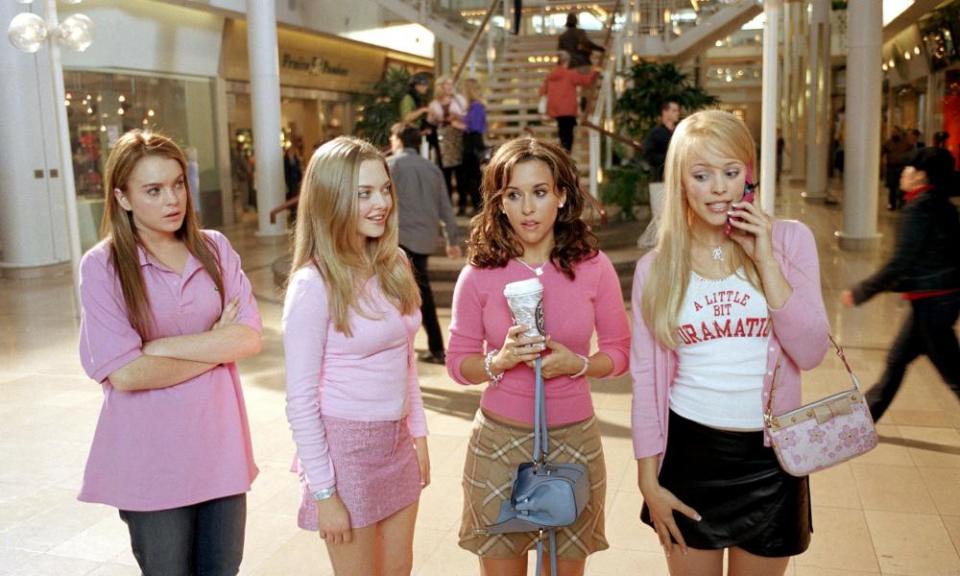'You can't sit with us': how Mean Girls and gifs became part of global diplomacy
Should we be concerned after the US Israeli embassy responded to Iran’s supreme leader with a Regina George quote?

This week, Iran’s supreme leader, Ayatollah Ali Khamenei, ordered preparations to be made to begin enriching uranium if the 2015 nuclear deal collapses completely. It’s a move that could further destabilise relations between Iran and the west and begin a nuclear arms race in the Middle East. The ayatollah followed up with tweets saying Israel was a “cancerous tumour” that must be “removed and eradicated”.
How did the Israeli embassy in the United States respond to this potential doomsday scenario? With a Regina George gif from Mean Girls:
— Embassy of Israel (@IsraelinUSA) June 4, 2018
It’s the latest case of countries acting like warring reality TV stars, using gifs and memes to send “shade” across borders.
Take the Crimean peninsula, where armed conflict has been simmering between Ukrainian and Russian forces since 2014. The war has often been bloody, but online, the countries have been sparring in more jovial terms. Last month, the official national Twitter accounts of the respective countries were arguing over who could lay claim to the 11th-century French monarch Anne de Kiev. Annoyed that @Russia was claiming that a monarch born in Kiev was Russian, @Ukraine posted a gif taken from an episode of The Simpsons in which the Russian ambassador to the UN flicks around a “Russia” nameplate to read “Soviet Union”.
You really don't change, do you? pic.twitter.com/HDfS9A8jWZ
— Ukraine / Україна (@Ukraine) May 30, 2017
It’s not the first time Ukraine has used TV gifs to wind up Russia. When the country expelled 13 Russian diplomats following the Salisbury attack in the UK, in which a former KGB agent and his daughter were poisoned, Ukraine enlisted the support of The Master from Doctor Who to wave them on their way.
Ukraine expels 13 @Russia diplomats in coordinated effort with 14 EU member states and U.S. condemning #Salisbury attack and poisoning of Sergei Skripal and his daughter Yulia pic.twitter.com/VSvaAchaNO
— Ukraine / Україна (@Ukraine) March 26, 2018
The Russian embassy in London is perhaps the most ruthless when it comes to the weaponising of memes. Not only does it mock the British government with gags about how frosty relations are, but it also has a “diplomatic club” – a fan club of sorts whose members are asked to retweet the account’s posts. In return, they can win prizes and potential receptions at the embassy. Essentially, the embassy uses fans to promote its cheap jokes so they reach a wider audience.
The temperature of 🇷🇺 🇬🇧 relations drops to ➖2️⃣3️⃣, but we are not afraid of cold weather. pic.twitter.com/mand9YyoaE
— Russian Embassy, UK (@RussianEmbassy) March 14, 2018
These tweets are obviously silly, but does that mean they shouldn’t be taken seriously? Are they just outbursts from low-level government employees blowing off steam – or do we have to see them as serious public statements?
These are questions the US has had to grapple with every time Donald Trump picks up his phone, and some have argued that it’s better to ignore the president’s tweets and focus on his actions. But Constance Duncombe, a lecturer in international relations at Monash University who has written papers on the role of social media in modern diplomacy, says we can’t ignore what happens online.
“We should take Twitter outbursts seriously, either as considered diplomatic signalling or as a personal response to feeling the image of one’s state has been tarnished or undermined,” she says. “Diplomacy is not always about maintaining a polite demeanour, and diplomats will deploy subtle insults or snubs to bolster their national image or to manage the behaviour of their counterparts.”
What’s changed, she argues, is how public these outbursts have become. Settling scores in an accessible, cultural language, viewable to all, sends a clear message that might otherwise be difficult to project. “Using pop culture images, memes and gifs frames insults through humour or sarcasm, making the diplomat or state leader’s views instantly accessible and allowing its meaning to travel beyond the immediate interpersonal or institutional interaction.”
Not everyone is a natural at such exchanges. After Trump repeatedly tweeted about how awful the Paris climate accord was and even suggested the cold east coast could “use a little global warming”, the president of the European council, Donald Tusk, couldn’t quite match his bombast.
.@realDonaldTrump please don't change the (political) climate for the worse.
— Donald Tusk (@eucopresident) June 1, 2017
Perhaps Tusk should be applauded for maintaining a semblance of political demeanour. Or perhaps the only way to win in this new world is to fight fire with fire and he should have repurposed another Mean Girls quote: “The world is getting hot. It might even be hotter than Regina George.”

